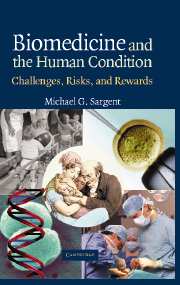Book contents
- Frontmatter
- Contents
- Preface
- 1 Challenges, Risks, and Rewards: Learning to Control Our Biological Fate
- 2 Learning to Breed Successfully
- 3 How Life is Handed On
- 4 Cells in Sickness and Health
- 5 Experiences in Utero Affect Later Life
- 6 Infection, Nutrition, and Poisons: Avoiding an Unhealthy Life
- 7 Signs of Ageing: When Renovation Slows
- 8 Cancer and the Body Plan: A Darwinian Struggle
- 9 Fighting Infection
- 10 Are Devastating Epidemics Still Possible?
- 11 Discovering Medicines: Infinite Variety through Chemistry
- 12 Protein Medicines from Gene Technology
- 13 Refurbishing the Body
- 14 Living with the Genetic Legacy
- 15 Epilogue: Signposts to “Wonderland”
- References
- Index
1 - Challenges, Risks, and Rewards: Learning to Control Our Biological Fate
Published online by Cambridge University Press: 06 August 2009
- Frontmatter
- Contents
- Preface
- 1 Challenges, Risks, and Rewards: Learning to Control Our Biological Fate
- 2 Learning to Breed Successfully
- 3 How Life is Handed On
- 4 Cells in Sickness and Health
- 5 Experiences in Utero Affect Later Life
- 6 Infection, Nutrition, and Poisons: Avoiding an Unhealthy Life
- 7 Signs of Ageing: When Renovation Slows
- 8 Cancer and the Body Plan: A Darwinian Struggle
- 9 Fighting Infection
- 10 Are Devastating Epidemics Still Possible?
- 11 Discovering Medicines: Infinite Variety through Chemistry
- 12 Protein Medicines from Gene Technology
- 13 Refurbishing the Body
- 14 Living with the Genetic Legacy
- 15 Epilogue: Signposts to “Wonderland”
- References
- Index
Summary
When our hunter-gatherer ancestors exchanged their timeless wanderings for the momentous opportunities of agriculture, they adopted a lifestyle of which they had had no previous evolutionary experience. This had significant consequences for their nutrition, their reproduction, their susceptibility to infection, and for the development of their children. As they became the dominant life form on the planet, they gained increasing control of the environment, but an understanding of the biology of their own species has eluded them until comparatively recently. In this introductory chapter, we shall explore episodes in our history in which remarkable institutions were established that made possible unprecedented insights into human biology.
Leaving Eden
For more than a hundred millennia our species has roamed the earth multiplying slowly, subsisting on animal and plant food, constantly adapting to changes in climate and to potential prey. We know little of their lives except that the Cro-Magnon people, the immediate ancestors of Europeans, hunted big game with what seems a mystical enthusiasm and buried their dead with some reverence. By the end of the last Ice Age, the herds of deer had dwindled away and human populations were reduced at one point to perhaps just 10,000 pairs, while our Neanderthal cousins became extinct. When the ice receded, the survivors' frugal existence, dependent on small animals and plant foods, began to improve as they learnt to grow plants and to manage domesticated animals.
- Type
- Chapter
- Information
- Biomedicine and the Human ConditionChallenges, Risks, and Rewards, pp. 1 - 19Publisher: Cambridge University PressPrint publication year: 2005
- 1
- Cited by



